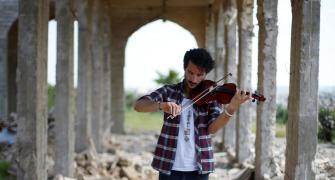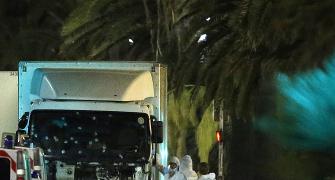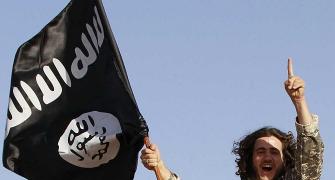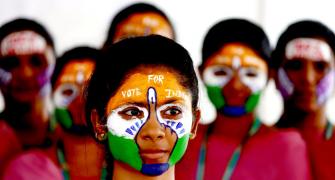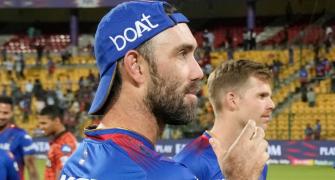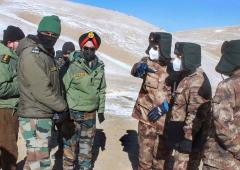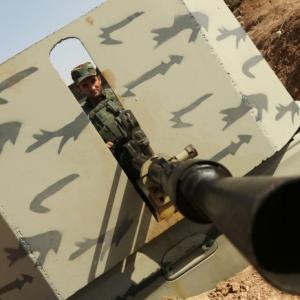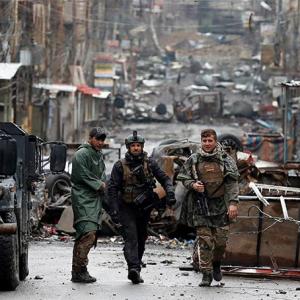'The war against ISIS is what earned the Kurds global recognition of being some of the best fighters that overshadowed regular armies,' points out Brigadier S K Chatterji (retd).
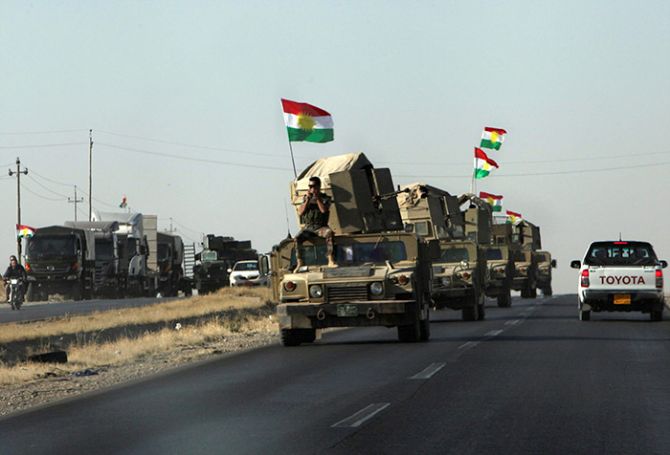
Kurds number a sizeable 30 million, mostly based in the neighbouring countries of Iraq, Turkey, Iran and Syria. They are also the largest ethnic lot of homeless wanderers yet to find a homeland for themselves.
The Kurds themselves have many divisions amongst them. However, by and large, they display overwhelming convergence on one issue: A Kurdistan for the Kurds.
Hopes of a greater Kurdistan were at its zenith after the break-up of the Ottoman empire.
The Treaty of Sevres was responsive to Kurdish aspirations and called for the creation of an independent Kurdish State encompassing the Kurdish majority areas of modern day Turkey.
Such a solution to meet Kurdish demands had the support of the then American president. However, Kemal Ataturk's nationalistic fervour led to the Treaty of Lausanne, burying Kurdish hopes for a hundred years that followed.
In the interim, the Kurds have repeatedly trudged with their meagre belongings on their backs, away from gunfire and repression, to re-enact repeatedly a story of mass migration.
It started with escaping from Mahabad in Iran where Mustafa Barzani had announced the establishment of the first Kurdish State.
In Turkey, assimilationist pressures on these fiercely independent people led to restraints on the Kurdish language and culture. The Kurdish identity faced a Turkish assault with Kurds being called mountain Turks.
Kurds barely found any international support till the first Gulf war ended. Then US president George H W Bush, under severe pressure after having halted the advance of US-led forces in the first Gulf war of 1991, decided to demarcate 'no fly zones', giving the Kurds some respite from Saddam Hussein. It was also the first-ever Kurdish area, recognised to be so.
The Iraqi Kurds had first attained some autonomy in 1970 after a protracted contest with the Iraqis. They created a democratic establishment when they elected a parliament in 1992 after the first Gulf war.
Iraq's 2005 constitution gave the Kurds the status of a federal State.
The Iraqis are also supposed to give 17 percent of their budget to the Kurds; a sharing arrangement that the Iraqis didn't quite honour, forcing the Kurds to locate a new revenue stream by selling oil.
The war against ISIS is what earned the Kurds global recognition. The Kurdish peshmerga were hailed as tough fighters, soldiers whose courage and grit overshadowed regular armies.
At Mosul, Iraqi soldiers retreated when attacked by ISIS terrorists. Their withdrawal was a shock. The billions of dollars that the Americans had spent to train and arm Iraqi troops seemed to have gone up in smoke.
The Peshmerga dislodged ISIS to hold Kirkuk and later partnered the Iraqis in the battle for Mosul.
In Syria too, with American partnership, the Kurds liberated large areas from ISIS.
Masoud Barzani, Mustafa Barzani's son and the president of Iraqi Kurdistan, could perhaps not have contemplated a more advantageous position to give Kurdish aspirations and his own chances of retaining power a push than the conditions available today.
With ISIS defeated -- at least in territorial battles -- and the Kurds recognised as having been a crucial factor for that military success, Barzani's calling a referendum on Kurdish independence from Iraq wasn't a surprise.
An astute politician, Barzani knew the current affection for the Kurds would diminish quickly now that ISIS had crumpled. It was just a matter of time!
For Barzani, it was an opportunity to gain an edge in domestic Kurdish politics.
The two main parties in Iraqi Kurdish areas are the Patriotic Union of Kurdistan and the Kurdish Democratic Party. The KDP is headed by Barzani whose father Mustafa had led the party earlier.
Masoud Barzani has been president since 2005. Re-elected in 2009, the Iraqi Kurdish parliament extended his tenure by two years in 2013. In 2015, no election was held neither did parliament approve his continuance in office.
Like the KDP, the PUK is also a divided house. Factions within each of these parties affect the cohesion of the Peshmerga, the Kurdish fighting force.
The negative international response that greeted the Kurdish referendum could not have been a surprise for Barzani. The fact that he included the amalgamation of disputed territories like Kirkuk in the referendum only made it more difficult for other nations to contemplate supporting him.
Iraqi hostility to the referendum was swift; the Iraqis halted all flights to Kurdish areas. The Turks soon joined the Iraqis.
The Americans spoke about legitimate Kurdish demands but unequivocally opposed the referendum. The Americans are categorical that they would not like to see the break up of Iraq.
The fact that Iran may make further incursions into Iraq would have weighed heavily on the American position.
The American stand on the Kurdish issue has vacillated over the years. In 2006, then US senator Joe Biden proposed dividing Iraq into Statelets. In 2014, the Kurds abandoned a referendum under American pressure.
Today, with Iran gaining ground in Iraq, the Americans believe supporting the Kurds would drive Baghdad firmly into Tehran's embrace.
Iran -- which has a restive and sizeable Kurdish population -- knows only too well that an independent Kurdish State near its borders will fan the Iranian Kurds' desire for a homeland.
After the Iraqi Kurdish referendum won a huge 'Yes' for independence, Baghdad moved its security forces to take over Kirkuk including the oil fields and airport.
Baghdad had already reached an understanding with a faction of the PUK. Divisions between the KDP and PUK helped the rulers in Baghdad. Barzani's cousin opposed him in the KDP, and that turned the tables decisively.
For the US, Iraq, Turkey and Iran, a destabilised Iraq is not in their interest. The situation that prevailed in Iraqi Kurdistan before the referendum is the desirable end state for them.
The Iraqi Kurdish government already controls education and taxation, it has its own military and diplomatic offices.
The big four want to ensure that Baghdad dominates the region with the Kurds being given ample freedom simultaneously to manage their affairs.
Kirkuk's oil wealth will remain a bone of contention between Baghdad and the Iraqi Kurdish government in Erbil. Both sides have to respect the decisions taken so far about sharing the budget outlay.
Baghdad is committed to providing 17 percent of the federal budget to the Kurds, something that needs to be adhered to.
The Kurds, similarly, cannot export oil on their own without involving the Iraqis. Major multinationals have contracts with the Iraqi Kurdish government for oil, complicating the situation. These issues will need to be dealt with by Baghdad with equanimity and professionally.
Barzani's move to call a referendum has in effect been detrimental to secure a Kurdish homeland.
The idea of a greater Kurdistan, inclusive of the Kurdish areas of Turkey, Iraq, Iran and Syria, has not been served by the referendum.
Barzani possibly did not realise that West Asia is tired of strife and is looking for normalcy to rebuild -- and not another contest that is bound to be bloody.
As of now, the international borders of Turkey, Iraq, Iran and Syria will remain sacrosanct with the Kurds opting for dialogue and pursuing greater allocation of Iraqi budgetary resources.

